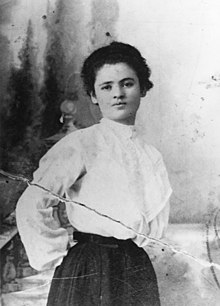Clara Lemlich
Clara Lemlich Shavelson (born March 28, 1886 in Horodok , † July 12, 1982 in Los Angeles ) was a leader in the riot of the 20,000 , the great strike of the New York cuff makers in 1909 . She was blacklisted for her union work and later joined the Communist Party. While still in the old people's home, she helped organize the nursing staff in a union.
Clara Lemlich was born into a Jewish family in Ukraine . As a child, she learned to read in Russian against her parents' wishes. She made money by sewing buttonholes and writing letters for the neighbors to buy books. In 1903 the family fled to the USA after the Kishinev pogrom .
Lemlich found work in the New York textile industry. Together with her colleagues, she rebelled against the long working hours, low wages, lack of opportunities for advancement and degrading treatment by the guards. She became a member of the International Ladies 'Garment Workers' Union and took on a managerial role.
She soon made a name for herself by organizing several strikes and challenging the male union members, but also for her courage and charm and her beautiful singing voice. Her ribs were broken by scabs in 1909, but she returned to her picket line.
She became known nationwide for her speech at the mass meeting on November 22, 1909 for the support of the strikers against the Triangle Shirtwaist Company and the Leiserson Company:
"I've listened to all the speakers and have run out of patience for words. I'm a working class girl, one of those who strike against unreasonable terms. I'm tired of listening to the platitudes of the speakers. We're here to decide whether we strike or not. I propose a resolution calling a general strike! "
The crowd enthusiastically agreed, and after taking the traditional Jewish oath "if I reveal the thing that I am here to pledge, may your hand fall off the arm I am raising," they called the general strike. Approx. 20,000 of New York's 32,000 cuff seamers took to the streets in the next few days; that was the riot of the 20,000 (New York shirtwaist strike of 1909), which lasted until February 10, 1910 and led to collective agreements in almost all companies, but not in the Triangle Shirtwaist Comp. This factory burned on March 25, 1911 , killing 129 girls and women between the ages of 13 and 25. Clara Lemlich lost a cousin and suffered a nervous breakdown when she looked in vain for her in the rubble. The entrepreneurs had locked the emergency exits of the work rooms.
Ostracized by entrepreneurs and the conservative union leadership, Lemlich devoted himself to the women's suffrage movement. Like her colleagues Rose Schneiderman and Pauline Newman , she considered voting rights to be a prerequisite for social change. But she also got into an argument with the bourgeois leaders of the women's suffrage movement. She then founded the Wage Earners League, a voting rights organization for women workers.
In 1913 she married Joe Shavelson. Their children were Irving Charles Velson (he later worked for the Soviet secret service), Martha Shavelson Schaffer and Rita Shavelson Margules. After the birth of her children, she switched to part-time work and founded a union for housewives (United Council of Working Class Housewives), which stood up primarily for consumer protection, but also for better housing and education.
Web links
- Life in the sweatshops
- Video: Clara Lemlich, A Strike Leader's Diary
- Clara Lemlich in the Jewish Women's Archive (English)
literature
- Orleck, Annalize Common Sense and a Little Fire: Women and Working-Class Politics in the United States, 1900-1965, Chapel Hill: University of North Carolina Press 1995
- Thomas Jeier: Emma's Path to Freedom, Fiction, Young Adult Books (Clara Lemlich acts as a mentor to the young Emma, ISBN 3-800-05234-2 )
| personal data | |
|---|---|
| SURNAME | Lemlich, Clara |
| ALTERNATIVE NAMES | Lemlich Shavelson, Clara |
| BRIEF DESCRIPTION | American unionist and communist |
| DATE OF BIRTH | March 28, 1886 |
| PLACE OF BIRTH | Horodok (Khmelnytskyi) |
| DATE OF DEATH | July 12, 1982 |
| Place of death | los Angeles |
